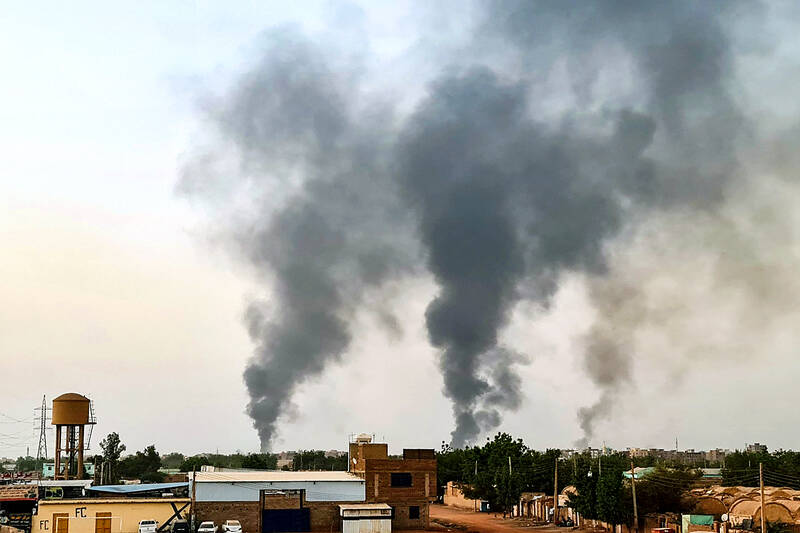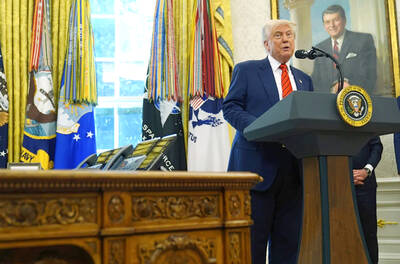Food manufacturing sites have been destroyed, aid warehouses looted and markets razed in Sudan’s five-week conflict, satellite imagery analyzed by Bloomberg showed, fueling a growing humanitarian crisis that has left about 20 million people in need of assistance.
The UN said it hopes that vital international aid for Sudan that has been blocked since April 15 would be delivered this week, as a seven-day ceasefire takes hold between the country’s warring generals.
However, the destruction of Sudan’s food supply chain — from the factory that produces 60 percent of its therapeutic infant food to key urban markets — has experts warning of dire economic consequences and a breakdown in the country’s social fabric.

Photo: AFP
“Destroying infrastructure has longer-term consequences. It weakens the integrity of systems and people’s sense of security,” said Raga Makawi, a researcher on Sudan who fled the capital, Khartoum, earlier in the conflict. “It also affects people’s livelihoods on a more structural level.”
More than 1 million people have been displaced since the conflict began on April 15, fleeing to safer locations inside and outside Sudan, while at least 1,000 people have been killed.
Compounding an already dire situation in Khartoum and cities across the Darfur region — the two epicenters of the conflict — are attacks targeting food factories and civilian marketplaces.
Flour, milk and bread producers have also stopped working.
On May 10, Samil Industrial Co, the country’s biggest infant food manufacturer, was looted and burned to the ground, satellite images provided by Planet Labs showed.
Shortly after fighting erupted last month, the food market near the town of El Fasher in northern Darfur was destroyed.
Another market in Omdurman, which neighbors Khartoum, burned in a massive fire on Monday last week, satellite images and videos posted on social media showed.
The UN has said that about US$2.6 billion is needed to implement its humanitarian response plan for nearly half of Sudan’s 45 million population.
Foreign aid is being held up by systematic looting and debilitating administrative delays, with supplies stranded at neighboring countries’ airports, it said.
UN flights have been denied clearance, while some aid workers have not been granted visas, three humanitarian officials said, asking not be identified as they do not have authorization to speak publicly.
“It’s getting more and more difficult to get supplies in Khartoum,” International Committee of the Red Cross in Sudan coordinator Germain Mwehu said. “There is a fear among humanitarian agencies regarding the looting of warehouses and offices.”
Since May 11, when the paramilitary Rapid Support Force and the Sudanese Armed Forces agreed to uphold aid access and protect civilians, there have been at least 11 attacks against humanitarian facilities in Khartoum, and four against health facilities, the UN said.
On Wednesday, as an uneasy calm appeared to take hold around the capital despite sporadic artillery fire in some areas, many UN agencies were still awaiting clearance for flights into the country and for convoys to leave the coastal city of Port Sudan.
A panel of US and Saudi Arabian monitors were verifying alleged breaches of the ceasefire, a US Department of State spokesperson said in Washington on Tuesday.
Since the latest pact was signed, “there is a lot of hope,” said Abdou Dieng, the UN’s humanitarian coordinator in Sudan. “We are getting ready to take the opportunity of this week to scale up our operation and try and assist the population.”

A new online voting system aimed at boosting turnout among the Philippines’ millions of overseas workers ahead of Monday’s mid-term elections has been marked by confusion and fears of disenfranchisement. Thousands of overseas Filipino workers have already cast their ballots in the race dominated by a bitter feud between President Ferdinand Marcos Jr and his impeached vice president, Sara Duterte. While official turnout figures are not yet publicly available, data from the Philippine Commission on Elections (COMELEC) showed that at least 134,000 of the 1.22 million registered overseas voters have signed up for the new online system, which opened on April 13. However,

ALLIES: Calling Putin his ‘old friend,’ Xi said Beijing stood alongside Russia ‘in the face of the international counter-current of unilateralism and hegemonic bullying’ Chinese President Xi Jinping (習近平) yesterday was in Moscow for a state visit ahead of the Kremlin’s grand Victory Day celebrations, as Ukraine accused Russia’s army of launching air strikes just hours into a supposed truce. More than 20 foreign leaders were in Russia to attend a vast military parade today marking 80 years since the defeat of Nazi Germany in World War II, taking place three years into Russia’s offensive in Ukraine. Putin ordered troops into Ukraine in February 2022 and has marshaled the memory of Soviet victory against Nazi Germany to justify his campaign and rally society behind the offensive,

CONFLICTING REPORTS: Beijing said it was ‘not familiar with the matter’ when asked if Chinese jets were used in the conflict, after Pakistan’s foreign minister said they were The Pakistan Army yesterday said it shot down 25 Indian drones, a day after the worst violence between the nuclear-armed rivals in two decades. Pakistani Prime Minister Shehbaz Sharif vowed to retaliate after India launched deadly missile strikes on Wednesday morning, escalating days of gunfire along their border. At least 45 deaths were reported from both sides following Wednesday’s violence, including children. Pakistan’s military said in a statement yesterday that it had “so far shot down 25 Israeli-made Harop drones” at multiple location across the country. “Last night, India showed another act of aggression by sending drones to multiple locations,” Pakistan military spokesman Ahmed

US President Donald Trump on Wednesday said that he would make a decision about how the US government would refer to the body of water commonly known as the Persian Gulf when he visits Arab states next week. Trump told reporters at the White House that he expects his hosts in Saudi Arabia, Qatar and the United Arab Emirates will ask him about the US officially calling the waterway the Arabian Gulf or Gulf of Arabia. “They’re going to ask me about that when I get there, and I’ll have to make a decision,” Trump said. “I don’t want to hurt anybody’s